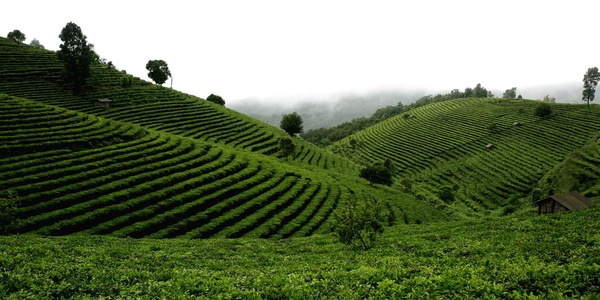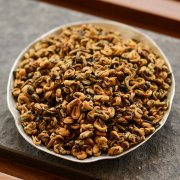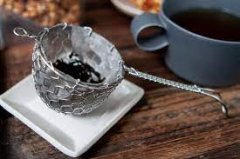The Origin, Development and History of Zhengshan Race Black Tea A short story about Jin Junmei's origin
The colorful History of Black Tea
There is still a lot of debate among tea scholars about when black tea was invented. We can be sure that by the 16th century, black tea began to appear in the Chinese tea market. Obviously, if you want to find the true origin of black tea production, you have to go back a little further.
Some people may say that the story of black tea began in the period of Emperor Hongwu in the early Ming Dynasty (1391). At this point, the custom of drinking tea has spread to all levels of Chinese society, spread to China's border areas, and formed a unique tea culture in South Korea and Japan. From one end of the map of China to the other, tea is made into a portable, pressed cake, which we now think of as green tea. In their day, these tea cakes were worth more than the same weight of gold and could easily replace hard currency. From tea trees to the tea market, every step of their production is controlled by the government. By the end of the Song Dynasty, the tea trade was famous for its wealth and corruption, but all this changed with the arrival of the new regime.
The Dark Age of Tea
Zhu Yuanzhang, the newly ascended emperor of the Ming Dynasty, made a creative political effort to crack down on corruption in the tea trade, ordering the production of compressed tea cakes to be stopped. At that time, it was stipulated that tea must be in a simpler and less convenient form: bulk tea. The emergence of bulk tea is a key development, which lays the foundation for further innovation of tea technology, one of which is black tea.

Until the Ming emperor stopped producing compressed tea, some of the best tea cakes came from Wuyi Mountain. Wuyishan has been a famous tribute tea area since the Song Dynasty (960-1279), but when the mode of production in the Ming Dynasty changed fundamentally, the tea factory in Wuyishan fell into a dormant state, and the equipment for producing this new form of tea was insufficient. Nearly 150 years later, there is hardly any tea in the factory in Wuyishan. However, tea remains in the area, planted and processed on a small scale by monks from many of Wu Yi's temples.
To avoid this dark age, temples in Wuyishan began producing bulk tea for market sale, trying to replicate Anhui's famous technique of frying loose green tea in bulk. The tea merchants in Wuyi Mountain have never made this kind of tea, so they will naturally make some mistakes. It was mentioned in the journal at the time that the color of the tea had turned red-a clear sign that the producers of the tea had failed to prevent cell oxidation from happening in the tea. Severe cell oxidation is a typical feature of black tea. It is worth mentioning that Chinese people have always called black tea "black tea" because the color of the oxidized tea is obvious. Therefore, black tea (or black tea) was finally born in these erroneous attempts in Wuyi Mountain at the end of the 16th century.
The legend of black tea production
There is a perhaps more colorful story about the origin of black tea, which comes from the local legend of Tongmu Village in Wuyi Mountain. The Jiang family, the producer of seven cups of Zhengshan race, has a history of 24 generations in Tongmu Village and claims to have tactfully invented black tea after the disaster hit the village's tea crops.
Tongmu Village in Wuyi Mountain is located in the geographical gateway connecting the southeast coast of China and the interior of central China. One spring in the mid-16th century, Tongmu Village found itself on the path of an army. As the soldiers occupied their houses, the farmers in the village were unable to process the tea that had just been picked. For soldiers, a pile of soft tea can make a good bed when they are stationed. Over the course of a week, the army moved on, leaving piles of black tea twisted and blackened by bruises. The soldier's weight and body heat, coupled with naturally fermented calories caused by pressure, heat and water, lead to changes in tea. Had it not been for a moment of perseverance, the harvest of green tea would have been ruined.
Important Notice :
前街咖啡 FrontStreet Coffee has moved to new addredd:
FrontStreet Coffee Address: 315,Donghua East Road,GuangZhou
Tel:020 38364473
- Prev

Where is the best quality of black tea in China? how much is the price of Yunnan Honggongfu black tea per jin?
Black tea, also known as black tea by the Chinese, is the most common product in tea trees. It is produced by blackening freshly picked tea leaves by oxidation of a large number of cells. Although black tea is the least popular kind of tea in China, it is drunk all over the world. Different styles of black tea there are three different ways of producing black tea in China. 1. Zhengshan race, the original style of black tea Wu Yishan
- Next

Which is the better difference between Zhengshan race and Laocong black tea? the taste characteristics of what kind of tea does the smoking race belong to?
Other historical puzzles about black tea it is said that, in any case, one of Jiang's great ancestors asked for the tea to be dried and sent to the market. Unexpectedly, foreign businessmen became interested in this completely different kind of tea. They not only bought all the tea, but also paid for the whole harvest next year. The details of the story are a little confusing, and some people say that these events are
Related
- Can lightly roasted coffee beans be used to extract espresso? How finely should you grind high-quality coffee beans to make Italian latte?
- What is the difference between the world's top rose summer coffee and Yejia Shefi? What are the flavor characteristics of Yega Shefi coffee and Panama rose summer?
- The ceremony is full! Starbucks starts to cut the ribbon at a complimentary coffee station?!
- A whole Michelin meal?! Lucky launches the new "Small Butter Apple Crispy Latte"
- Three tips for adjusting espresso on rainy days! Quickly find the right water temperature, powder, and grinding ratio for espresso!
- How much hot water does it take to brew hanging ear coffee? How does it taste best? Can hot water from the water dispenser be used to make ear drip coffee?
- What grade does Jamaica Blue Mountain No. 1 coffee belong to and how to drink it better? What is the highest grade of Blue Mountain coffee for coffee aristocrats?
- What are the flavor characteristics of the world-famous coffee Blue Mountain No. 1 Golden Mantelin? What are the characteristics of deep-roasted bitter coffee?
- Can I make coffee a second time in an Italian hand-brewed mocha pot? Why can't coffee be brewed several times like tea leaves?
- Hand-brewed coffee flows with a knife and a tornado. How to brew it? What is the proportion of grinding water and water temperature divided into?

